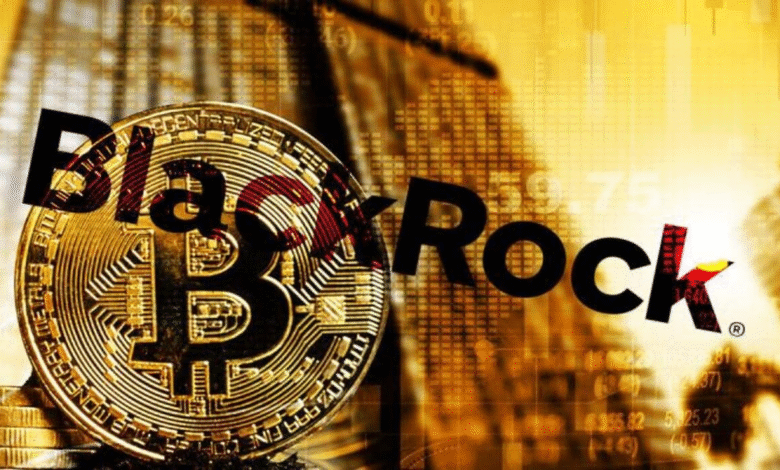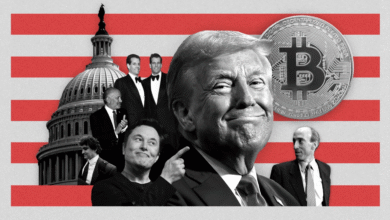Blackrock Bitcoin ETF Surpasses S&P 500 Fund Revenue

The Blackrock Bitcoin ETF is marking a revolutionary shift in the investment landscape, reflecting the booming interest in cryptocurrencies. As the largest asset manager globally, Blackrock has harnessed the growing institutional investment appetite for digital assets, making this ETF a focal point amid soaring crypto demand. Notably, the Blackrock Bitcoin ETF is reportedly generating more revenue than its flagship S&P 500 fund, showcasing a significant pivot in investor strategy towards cryptocurrency portfolios. This surge in popularity is driven by factors such as increased regulatory clarity and a desire for alternative investment opportunities. As traditional financial avenues face challenges, the Blackrock Bitcoin ETF stands as a testament to the evolving dynamics of asset management and investment preferences in today’s market.
The Blackrock Bitcoin ETF symbolizes a groundbreaking evolution in the realm of financial products, capturing the intense shift towards digital currencies among investors. With institutional players scrambling to integrate cryptocurrency into their strategies, this investment vehicle offers a crucial pathway to exposure in the burgeoning crypto sector. By redefining asset allocation norms, the growing interest in Bitcoin-centric funds illustrates the increased acceptance of alternative assets in mainstream portfolios. As traditional equities face competition from innovative trading platforms, the demand for cryptocurrency derivatives continues to rise. Thus, the Blackrock Bitcoin ETF not only reflects current market trends but also paves the way for future investment strategies centered around digital assets.
Blackrock’s Bitcoin ETF: A Game Changer in Institutional Investment
Blackrock’s Bitcoin ETF, known as the Ishares Bitcoin Trust (IBIT), exemplifies a significant shift in the investment landscape, particularly for institutional investors. As the demand for cryptocurrency assets surges, IBIT has quickly garnered attention, surpassing traditional funds like the Ishares Core S&P 500 ETF (IVV) in revenue generation. This shift not only underscores a changing sentiment towards digital assets but also highlights the growing importance of Bitcoin as a strategic component in an institutional investment portfolio.
The implications of Blackrock’s ETF performance are profound, as they reflect a wider trend within the financial industry toward adopting cryptocurrencies. Institutional investors are increasingly seeking exposure to Bitcoin and other digital assets, driven by the perceived benefits they offer in diversifying traditional portfolios. With the substantial annual revenue potential of IBIT underscoring the attractiveness of cryptocurrencies, there is a clear indication that the appetite for crypto investments among institutional players is at an all-time high.
The Rise of Crypto Demand and Its Impact on Financial Strategies
The rising demand for cryptocurrencies is reshaping financial strategies across the board. Investors are no longer satisfied with conventional equity investments; they are turning to Bitcoin and other digital assets as essential components of their financial strategies. This transition is supported by data showing that the revenue generated from Bitcoin ETFs like IBIT now exceeds that of traditional investment vehicles. This trend points to a significant cultural shift where investors are willing to allocate more of their assets towards cryptocurrencies to capitalize on their growth potential.
Moreover, the increasing acceptance of cryptocurrencies among institutional investors reflects a broader understanding of their potential as alternative assets. As firms like Blackrock recognize the financial viability of Bitcoin, we can expect enhanced integration of digital assets into mainstream investment portfolios. This demand signifies that investors see Bitcoin not just as a speculative asset but as a valuable tool for hedging against market volatility and inflation.
Blackrock’s Bitcoin ETF and Its Competitive Edge in the Market
Blackrock’s introduction of its Bitcoin ETF represents a competitive edge in the rapidly evolving cryptocurrency market. Despite having significantly less capital than traditional funds, IBIT has quickly established itself as a leader in terms of market share and revenue. With its competitive 0.25% expense ratio, IBIT has attracted a substantial amount of assets, demonstrating that institutional investors are keen to take advantage of the robustness and versatility that a Bitcoin ETF offers. This shift highlights a growing trend where ETF products are preferred over direct cryptocurrency investments due to their regulatory advantages and easier accessibility.
Furthermore, the performance metrics of IBIT compared to traditional ETFs emphasize its attractiveness to investors. The ability to generate more revenue despite a smaller asset base illustrates strong investor confidence in Bitcoin’s potential. As more institutions look to include diversified digital assets within their portfolios, IBIT sets a precedent for how cryptocurrency can be integrated with traditional investment strategies, promising continued growth and innovation in the financial sector.
Navigating Regulatory Changes: The Future of Bitcoin ETFs
As the landscape for Bitcoin ETFs evolves, regulatory clarity plays a crucial role in shaping the future of institutional investments in digital assets. The recent approvals of spot Bitcoin ETFs by U.S. regulatory bodies signal a willingness to embrace innovation in financial products, fostering an environment conducive for institutional participation. This regulatory backing has significantly boosted investor confidence, paving the way for more hedge funds and pension funds to explore Bitcoin as a viable component of their investment strategies.
Additionally, the acceptance of Bitcoin as a mainstream investment reflects a broader trend where regulatory transparency and compliance are becoming key factors for institutional investors. As Blackrock and other major players move forward with their Bitcoin ETFs, the anticipated evolution in regulations will likely facilitate further adoption, allowing financial institutions to explore various avenues for incorporating cryptocurrency into their overall investment portfolios.
Hedge Funds, Pension Funds, and Bitcoin: The Institutional Shift
The growing interest of hedge funds and pension funds in Bitcoin and other cryptocurrency assets represents a transformative shift in institutional investment philosophy. Traditionally risk-averse, these investors are now actively seeking ways to incorporate Bitcoin ETFs into their portfolios. Blackrock’s Bitcoin ETF, with its impressive early performance metrics, serves as a case study in how institutional players can successfully navigate this evolving space and tap into burgeoning demand for digital assets.
Incorporating Bitcoin into these large portfolios is not merely a trend but a calculated strategy to balance risk against potential returns. As financial experts outline the viability of Bitcoin as a hedge against inflation and currency fluctuations, it becomes clear that institutional investors see the value in diversifying their holdings with crypto solutions like IBIT. This paradigm shift could lead to a plethora of innovations in the investment landscape and an accelerated pathway for broader Bitcoin adoption.
Bitcoin’s Role as Digital Gold: Insights from Industry Leaders
Industry leaders, including Blackrock’s CEO Larry Fink, have begun to draw parallels between Bitcoin and traditional safe-haven assets like gold. This comparison underscores Bitcoin’s role as a hedge against economic instability and inflationary pressures. Fink’s assertion that Bitcoin could be considered ‘digital gold’ encapsulates a growing recognition of its potential. As macroeconomic factors drive uncertainty, many investors are looking to Bitcoin as a viable alternative store of value, provoking discussions on its long-term viability in diversified portfolios.
The implications of viewing Bitcoin through this lens are significant, as it lends credibility to its adoption in institutional investment frameworks. The perspective of Bitcoin as ‘digital gold’ resonates with a broader audience, granting it a more established place among traditional asset classes. As institutional appetite grows, Bitcoin’s place in a reimagined investment landscape strengthens, reinforcing its importance in navigating future financial uncertainties.
The Impact of Geopolitical Uncertainty on Bitcoin Investments
Geopolitical uncertainty has long been a catalyst for shifts in investment strategies, and Bitcoin is no exception. As national debts rise and political stability wavers, Bitcoin presents itself as a hedge against such uncertainties. The recent comments by Blackrock’s Larry Fink highlight this trend, where institutional investors are beginning to view Bitcoin as a fail-safe asset. With the potential for geopolitical crises to disrupt traditional markets, Bitcoin’s decentralized nature positions it as an attractive option for those seeking security for their investments.
Moreover, the ability of Bitcoin to operate outside of governmental influence aligns well with the needs of investors looking for alternatives in tumultuous times. As institutional money flows into Bitcoin driven by these geopolitical fears, we are witnessing a paradigm shift where formerly cautious investors consider cryptocurrencies as viable alternatives to withstand economic adversity. This trend could pave the way for Bitcoin to become a standard consideration in institutional investment strategies going forward.
Transforming the Cryptocurrency Portfolio: Blackrock’s Innovative Approach
Blackrock’s innovative approach to integrating Bitcoin ETFs into traditional investment portfolios showcases its commitment to evolving with market demands. By offering accessible tools for institutional investors to engage with digital assets, Blackrock is transforming how these portfolios are constructed and managed. The growing success of IBIT demonstrates that institutional investors are not only interested in diversifying their holdings but are also ready to capitalize on the unique advantages offered by cryptocurrency investments.
As firms explore the benefits of digital assets, there is a marked shift towards a more dynamic and adaptable investment strategy. The inclusion of Bitcoin ETFs means that institutional wallets can benefit from both equity and cryptocurrency exposure, enhancing overall portfolio performance. This innovative move by Blackrock heralds a new era in investment management, where blending traditional and digital assets leads to even greater possibilities for growth and stability in a changing financial landscape.
Bitcoin Acceptance in Mainstream Financial Markets: A Look Ahead
The acceptance of Bitcoin in mainstream financial markets is accelerating at an unprecedented pace. As major asset managers like Blackrock continue to champion digital assets through initiatives like their Bitcoin ETF, we are likely to see a ripple effect across the financial industry. This indicates a growing consensus that Bitcoin and other cryptocurrencies are key players in future investment strategies. Such advancements could mark a pivotal moment in the evolution of financial instruments, where cryptocurrencies are firmly embedded in the investment ecosystem.
The integration of Bitcoin into traditional financial markets is set to further normalize its use among investors. As regulatory frameworks develop and institutional players embrace these digital assets, Bitcoin could very well become a core component of portfolio management strategies. This evolution not only validates the legitimacy of cryptocurrencies but also encourages more significant investments from entities previously resistant to diversifying into digital assets.
Frequently Asked Questions
What impact is Blackrock’s Bitcoin ETF having on institutional investment in cryptocurrencies?
Blackrock’s Bitcoin ETF, known as Ishares Bitcoin Trust (IBIT), is significantly influencing institutional investment in cryptocurrencies. It is currently generating more revenue than Blackrock’s flagship S&P 500 ETF, demonstrating a clear shift towards digital assets as institutional investors seek exposure to the growing crypto demand.
How does Blackrock’s Bitcoin ETF compare to traditional equity funds in terms of revenue generation?
As of now, Blackrock’s Bitcoin ETF is surpassing the revenue generated by its traditional S&P 500 fund. Although IBIT’s assets under management are much smaller, its higher expense ratio results in greater overall revenue, highlighting the increasing appeal of Bitcoin ETFs amidst rising interest in cryptocurrency portfolios.
Why has the approval of Blackrock’s Bitcoin ETF boosted cryptocurrency demand?
The approval of Blackrock’s Bitcoin ETF by U.S. regulators has opened the floodgates for institutional money to enter the crypto market. This increased regulatory clarity has encouraged hedge funds, pension funds, and banks to explore Bitcoin as a lucrative option within their cryptocurrency portfolios, significantly driving demand.
What does Larry Fink’s support for Bitcoin mean for the future of Blackrock’s Bitcoin ETF?
Larry Fink’s newfound support for Bitcoin as ‘digital gold’ signals a major endorsement for Blackrock’s Bitcoin ETF. His views on Bitcoin’s role as a hedge against inflation and his predictions of substantial price increases could lead to higher institutional interest, further solidifying the ETF’s position in digital assets.
What advantages does Blackrock’s Bitcoin ETF offer compared to other digital asset investment options?
Blackrock’s Bitcoin ETF offers the advantage of liquidity and transparency, appealing to institutional investors who prefer to gain Bitcoin exposure without needing to manage separate accounts. The ETF’s structure minimizes complexity while allowing investors to tap into the significant growth potential of cryptocurrencies.
How is Blackrock’s Bitcoin ETF positioned in the broader cryptocurrency ETF market?
Blackrock’s Bitcoin ETF currently commands over 55% of the total market share in bitcoin ETFs, according to recent statistics. Its ranking among the top 20 ETFs by trading volume reflects a growing trend where traditional investors are willing to invest in innovative digital assets like Bitcoin.
What does the performance of Blackrock’s Bitcoin ETF indicate about future trends in crypto demand?
The performance of Blackrock’s Bitcoin ETF suggests a growing demand for cryptocurrencies among institutional investors. As more funds allocate resources to Bitcoin, potentially viewing it as a strategic asset, this trend indicates that digital assets are becoming increasingly central to investment strategies across the board.
| Key Points | Details |
|---|---|
| Blackrock Bitcoin ETF Revenue | Blackrock’s Ishares Bitcoin Trust ETF (IBIT) now earns more revenue than its flagship S&P 500 ETF (IVV). |
| Investor Demand | There is increasing institutional demand for cryptocurrency exposure, surpassing traditional equity strategies. |
| IBIT vs IVV Assets | IBIT has assets nearly nine times smaller than IVV but generates higher fee revenue due to its expense ratio. |
| Historical Context | IBIT’s annual revenue is approximately $187.2 million compared to IVV’s $187.1 million, indicating significant demand for Bitcoin ETFs. |
| Regulatory Influence | The approval of spot Bitcoin ETFs by U.S. regulators has facilitated increased institutional participation in crypto. |
| Market Share | IBIT currently holds over 55% of the total market share in Bitcoin ETFs, highlighting its popularity among investors. |
| Industry Support | Blackrock CEO Larry Fink now promotes Bitcoin as a hedge against inflation and currency devaluation, aligning with views of Bitcoin as ‘digital gold’. |
Summary
The Blackrock Bitcoin ETF marks a transformative moment in the investment landscape, showcasing how digital assets are increasingly embedding themselves in institutional portfolios. With Blackrock’s Ishares Bitcoin Trust ETF outpacing its traditional S&P 500 fund in revenue, it demonstrates the rising demand for cryptocurrency as investors seek new avenues for portfolio diversification. Institutional players are recognizing Bitcoin’s potential as a store of value amidst inflationary pressures, which is reshaping the asset management industry. As more regulatory clarity emerges, the Blackrock Bitcoin ETF is poised for continued growth, potentially leading to further mainstream acceptance of Bitcoin as a fundamental asset class.




